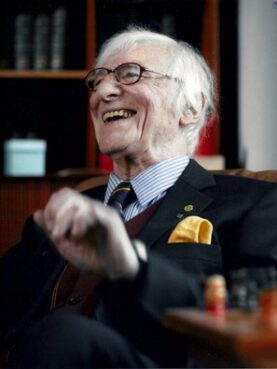(RNS) — When I started graduate school half a century ago, my adviser, the Western medievalist Giles Constable, urged me to take a course in Greek hagiography with the Byzantinist Ihor Ševčenko, newly arrived as a member of the classics department. Though my Greek was nothing to write home about, I dutifully enrolled.
The experience was unforgettable, and not just because it involved sitting around a seminar table working through Athanasius’ “Life of Saint Antony” with a brilliant scholar who insisted that no philological, religious or art-historical stone be left unturned. There was above all Ševčenko himself — tall, as worldly as he was erudite, with a roguish grin and a larger-than-life story of his own.
He was born in Poland in 1922, the son of a Ukrainian refugee who had served as an official in the government of the independent Ukraine while it existed for a short time after the Russian Revolution. His family, he made sure the two Jews in the seminar knew, lived in what became the Warsaw Ghetto. (He also let us know that some of the worst perpetrators of Ukrainian pogroms had been his heroes growing up.)
If Ševčenko felt an affinity with his Jewish neighbors, it was because he, an Orthodox Christian, was socially ostracized by his Catholic classmates at Warsaw’s elite Adam Mickiewicz Gymnasium and Lyceum. According to an insightful and moving recollection by his student Maria Mavroudi, he indicated it was this sense of outsiderness that led him to devote his life to understanding the Byzantine roots of Ukrainian and Slavic identity.

Ihor Ševčenko. Courtesy photo
During World War II, Ševčenko earned a doctorate at Charles University in Nazi-occupied Prague, and later he picked up another at the University of Louvain in Belgium. Immediately after the war, he worked with displaced Ukrainian refugees in Germany. There, he obtained permission from George Orwell to do a Ukrainian translation of “Animal Farm” for them — for which Orwell wrote a special preface.
In a letter of introduction to the Belgian historian of medieval science George Sarton in 1947, Ševčenko said he was “apatride, d’origine Ukrainienne” — countryless, of Ukrainian origin. Mavroudi notes that, feeling most at home as a foreigner, he often called himself a cosmopolitan, “referring to the Stalinist persecution of ‘cosmopolitans’ which included, first and foremost, the Jews.”
That was certainly my own sense of him. With a raised eyebrow he referred to the scholars at the then-new Harvard Ukrainian Research Institute as “the Ukrainians.” So far as he was concerned, they and the institute’s wealthy donors were living out a fantasy of an independent Ukraine. But at least, he conceded, funding historical research was better than investing in a hopeless armed insurgency.
His cosmopolitanism, however, turned out to be something of a carapace, under which a Ukrainian patriot’s heart continued to beat.
After the Soviet Union collapsed and Ukraine did in fact become its own country again, he began writing essays on its cultural identity. These were published as a book in 1996 — and in a second edition in 2009, the year he died — titled “Ukraine Between East and West.” He dedicated it to the memory of his father, “who believed in Ukraine and spent much of his life furthering her cause.”
“In Kiev it is easy to illustrate the topic of my paper,” begins an identically titled article he published in 1992. “Thus, to give an example, those among us who have had the time to visit the Cathedral of St. Sophia have again realized that the eleventh-century church, with its Byzantine mosaics and Greek inscriptions in the interior, is almost totally covered on the outside by architectural accretions in the style of the Western Baroque.”
Being Ševčenko, he did not miss an opportunity to stress the ironies. Ukraine’s Eastern side, the side that was Byzantine Slav, developed thanks to the West — by way of education in Greek obtained from Polish Jesuits. And Western influence often came from the East — by way of Europeanized Russians in St. Petersburg.
But above all, Ševčenko understood that centuries of history cannot easily be wiped away. In a closing footnote he cautioned against this latest Ukrainian turn toward the West.
The recent rapid and spectacular changes in Ukraine do not dispose of problems discussed in the present paper. Such changes do tend to turn the attention of local elites and of Ukrainians abroad toward the West and the future — a good thing — but at the risk of foreshortening and blurring the historical perspective. The Byzantine heritage of both Greek-Orthodox and Greek-Catholic Ukrainian populations and more recent long-range developments — the latest of which is the Russian cultural impact upon a large part of Ukrainian lands — can recede into the background in the heady atmosphere of change, but their effects will not disappear overnight.
The centenary of Ševčenko’s birth occurred two weeks before Russia invaded Ukraine. I expect he would have been heartbroken at how his understated prophecy came true.






